Alumni Spotlight: Pat Jackson, Law and Policy Doctoral Graduate 2022
Shelter is more than having a roof over your head. One woman’s journey from homelessness to the corner office.
Pat Jackson, graduated from the Doctor of Law and Policy (DLP) program in 2022 and is now the Executive Director of Habitat for Humanity of Greater Providence and East Bay, a nonprofit organization that provides housing support services to over 175k people.
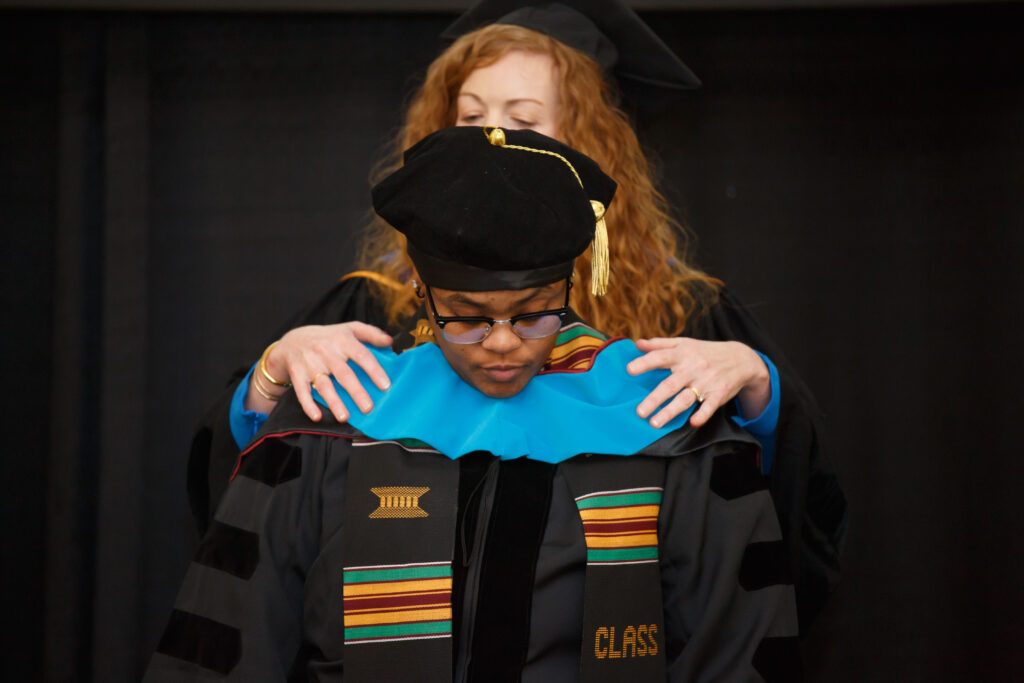
Prior to this, Jackson was the Interim Executive Director for Brockton Development authority, a quasi-public agency in Massachusetts focused on the economic revitalization and community development for the city residents, a population of more than 100,000.
In Rhode Island, along with major city power brokers and elected officials, Jackson helps make decisions about commercial and residential real estate investments. She also advocates for people who are experiencing homelessness and develops programs to benefit low- and moderate-income households.
Her dedication to serving others and her commitment to those who are experiencing homelessness is more than a job. It’s personal.
The Difficult Journey
When Jackson was eight years old, she and her family experienced homelessness. They lived in their car and in shelters where it was mandatory to check in every evening and check out the next morning. Her father suffered from a substance use disorder, making it difficult for her mother to afford rent on her own and meet the needs of their six children.
That cycle of uncertain housing and insecurity ended when Jackon’s mother got a job at one of the best places to work at the time in Kansas City, Kansas—the Proctor and Gamble factory.
Education and Academic Credentials
When Jackson became an adult, she moved to Parkville Missouri, a fifteen-minute journey from her birthplace in Kansas City. She received her bachelor’s degree in public administration from Park University, a small local college that identifies social responsibility as one of its core values. After graduation from Park University, Jackson worked at Tyson Foods.
On a whim in 2015, she took a vacation trip to Boston and as she ended an enjoyable duck boat tour with friends, the duck boat stopped downtown. Jackson alighted and went to a Dunkin Donuts to grab a drink. After purchasing a coffee, on her way out of the store, she said, “That’s when my life changed.”
As she left the Dunkin Donuts store, Jackson bumped into someone, spilling her coffee all over the other woman’s shirt. She apologized and gave the woman, named Sasha, her phone number with a promise to buy her a new shirt. Sasha called while Jackson was still in Boston, and they had ‘a couple more dates’. Jackson says, “I did buy her that new shirt!”
After Jackson returned home, she stayed in close contact with Sasha. They began a long distant relationship and in 2016, Jackson quit her job at Tyson’s and moved to Boston.
Jackson didn’t know anything about Northeastern or CPS before she applied. But she always knew that she wanted to continue her education and get her master’s degree; she was just waiting for the opportunity. Sasha, who grew up in Roxbury right next to the Northeastern campus, told her about Northeastern’s legal studies program. Jackson applied, got accepted, and concentrated on a Business Law degree. She then went on to become a Double Husky, obtaining her doctorate in 2022.
It was an amazing onboarding experience,” Jackson said. The advisor said ‘hey, we have a Law program and I think you’d be a great fit’ and I applied and got in and the professors were so supportive. Advisors really can shape your life!”
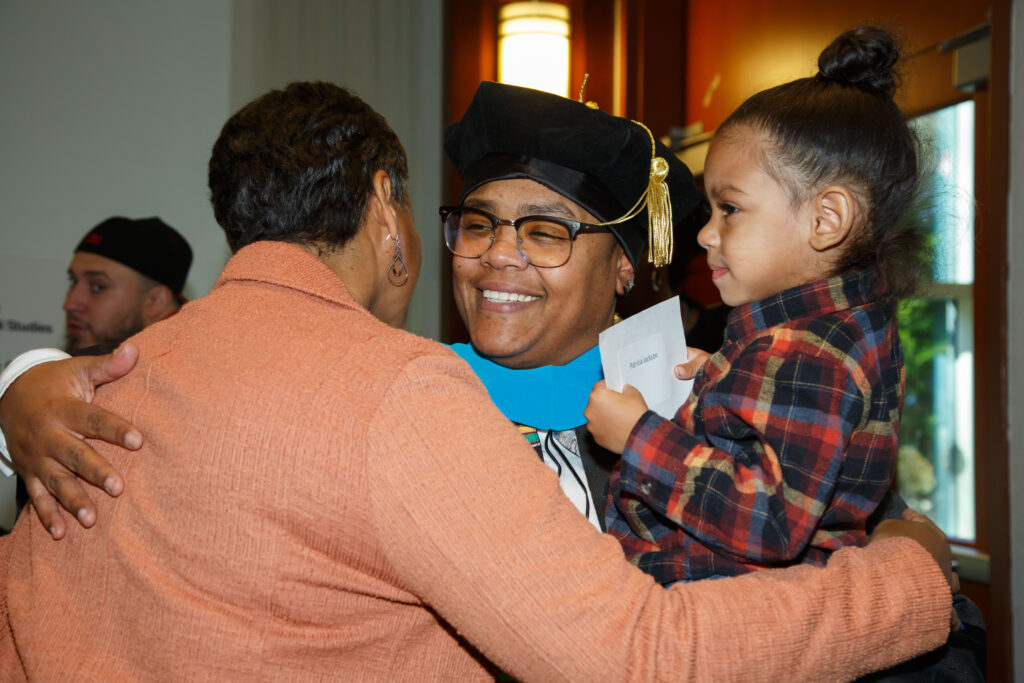
Jackson liked the fact that the Doctor of Law and Policy program was aimed at experienced professionals seeking to effect change through a deeper understanding of the origins, development, implementation and analysis of legal and public policy decisions.
Jackson identified three classes in the program that helped her the most in her current role:
- The Law and Legal Reasoning course gave her a more in-depth look at how the courts operate, and their impact on policy making and implementation.
- Dr. Theodore Johnson’s Historical Foundations of American Law class forced her to think outside the box on the creation of law and policy, and Johnson was the second reader on her dissertation.
- And, the Public Policy Theory and Practice course that included the former Massachusetts Speaker of the House, Robert DeLeo, Northeastern University Fellow for Public Life, and a member of the College of Professional Studies left a particularly indelible mark.
“The way [DeLeo] talks about tackling some of the tougher policies and the need for both sides of the aisle to work together for a more common and purposeful goal was inspiring.”
Pat Jackson
Since graduating with her PhD, Jackson is particularly intentional about applying the learnings from her courses and fellow classmates. Today, she is a champion for challenging the assumptions of what it means to experience homelessness.
Mentors and Cohorts

“The assumption that ‘once you’re housed, the problems will go away’ is false. Take a young woman, named Jane, who is homeless with a drug addiction. If you give her a home, it doesn’t mean her drug addiction will go away. I believe there should be something to help her with her addiction so she can stay in her housing. We talk about how many people we house but we don’t talk about recidivism, how many times the same person comes back through the system. Housing services demand additional wrap-around services, and that’s what I advocate for, because I’m looking for real results.”
In Massachusetts, the current model is a ‘Housing First’ philosophy. Jackson thinks this can be improved but she also sees that it’s making a positive impact.
“The housing system is similar to the penal system,” she said, “if we keep seeing people coming back, we should be focusing on what we need to do to prevent them from coming back again.”
Jackson also recognizes the importance of having a mentor and an advocate to help identify jobs, transportation options, substance use disorders and mental health programs when needed.
On the advocacy front, Jackson is currently working with several legislators to advance opportunities in the state to make progress. She has also teamed up with several local activists to visit the state house and talk about affordable home ownership and changes to the landscape of neighborhood design,
“I’m all about building the neighborhood to establish the village,” she said.
Advice for Prospective Law and Policy Students
Asked what advice she might impart to prospective students, Jackson said:
“The spectrum for what you can do with this degree is so wide. This program helps shape the way that you look at work from a macro level. It enables you to be an advocate and dig deep to find out what you are willing to fight for and where you are willing to advocate for change.”
Pat Jackson
As for what higher education institutions like CPS and Northeastern can do for housing advocacy, Jackson has thoughts on that, too.

In our program curriculum, it’s important to start these conversations earlier. For me, we didn’t start this conversation until my senior year. So, it’s the institution taking proactive steps towards inclusivity, making sure they include the people who reside in these neighborhoods in the planning of the curricula and identifying the real-world issues around every topic. And giving that a platform in the classroom.
She said that individuals who are keen to become active beyond the classroom can consider joining the boards of local Community Development Committees (CDCs), join the local NAACP or action firms that have housing and legislative meetings, attend public meetings, and make sure they stay informed.
She says, “Go to ‘advocacy day’ at the state house and speak out against things. Don’t let issues like this die.”
What Freedom of Religion Should Look Like in Public Schools After a Recent Supreme Court Decision?
As students are set to return to classrooms for a new school year, the Supreme Court’s recent 6-3 decision in Kennedy v. Bremerton School District is raising fears that the ruling undermines the traditional separation of church and state in public education.
Karen Reiss-Medwed and Noor Ali, professors in the Graduate School of Education at CPS, argue that K-12 schools need to do better in recognizing and honoring the identities of students who belong to religious minorities.
Is There a New Labor Movement Afoot in the US?
Former top advisor to President Biden and Distinguished Professor of the Practice Seth Harris weighs in on efforts to unionize at Amazon, Starbucks and more and the impacts of the COVID-19 pandemic on workers. Harris teaches in the Northeastern College of Professional Studies doctoral program in Law and Policy and is an affiliated faculty member and senior fellow, Burnes Center for Social Change at Northeastern University.
Four Students Were Named 2022 RISE Award Winners
Students, faculty, staff across Northeastern University, and industry leaders participated in the university’s annual RISE (Research, Innovation, Scholarship, Entrepreneurship) exhibition on April 14, 2022, a showcase for multidisciplinary student research and creative projects. Student competitors had the opportunity to virtually present their research to industry professionals and potential employers or investors.
This year, four College of Professional Studies graduate students were named RISE Award winners across three categories:
Category: Business and Entrepreneurship
Mary McNamara, Doctor of Education student ’22: Mentoring Others Elevates All: The Benefits of Diverse Mentor-Entrepreneur Dyads
- Mentor: Lindsay Portnoy, Associate Teaching Professor, Doctor of Education program
Corey Ortiz, MS Corporate and Organizational Communication student ’23: Feeling the Crunch: Expectations of Crunch Time in the Video Game Industry
- Mentor: Gladys McKie, Lecturer, MS Corporate and Organizational Communication program
Category: Interdisciplinary Topics, Centers, and Institutes
Asha Kiran Makwana, MPS Analytics student ‘22: KAPI (Keyboardless ASL-inspired Programming Interface)
- Mentor: Beverly Quon
Category: Social Sciences, Humanities, and Law
L’Bertrice Solomon, Doctor of Law and Policy student ‘22: Let Me Live: Corporate Environmental Exceptions, Failed Environmental Protections in Louisiana
- Mentor: J.D. LaRock, Professor of the Practice, Doctor of Law and Policy program
Congratulations to our awardees!
Doctoral Graduate Earns Fulbright Specialist and Huntington 100 Honors
If not for the coronavirus, Cherron Payne (CPS 20’) might be packing her bags right now for an international service project on behalf of the U.S. State Department.
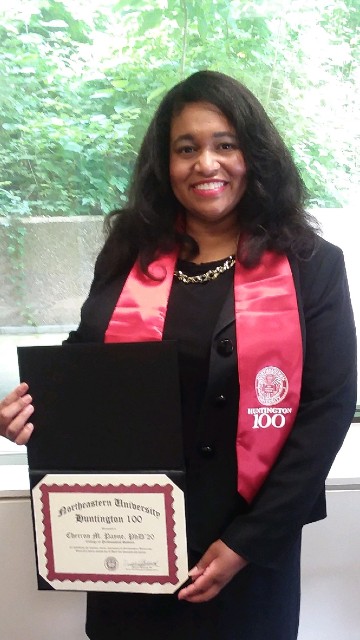
Dr. Payne, who earned her Doctor of Law and Policy degree from the College of Professional Studies, was recently accepted into the Fulbright Specialist Program. This prestigious initiative sends out 400 U.S. faculty and professionals every year to “serve as expert consultants on curriculum, faculty development, institutional planning, and related subjects,” at academic, cultural, and non-governmental institutions for a period of two to six weeks, according to the program’s website.
“It could be a variety of assignments,” said Dr. Payne about her prospective Fulbright Specialist project. “It could be teaching, starting a legal studies program, or serving as a consultant to either an academic or cultural institution. I may even be able to perform work aligned with my dissertation.” Her dissertation, for which Professor Bobby Hazelton served as her adviser, examined judicial reform and court operations
While COVID-19 has put her Fulbright plans on hold for the foreseeable future, Dr. Payne already has plenty to keep her busy. She has operated her own law practice –Farmington’s ACP Law Firm, LLC – since 2010 and has been a magistrate in Connecticut for nine years. In 2016, former Connecticut Governor Dan Malloy appointed her to chair the state Commission on Human Rights and Opportunities, the oldest state civil rights agency in the country. She has also worked part-time as a Contract Specialist for the University of Connecticut Health Center for the past decade.
It’s all in keeping with Dr. Payne’s lifelong pursuit of achievement, which has included playing the viola in the Colchester Civic Orchestra, earning a black belt in taekwondo, and founding the Global Motion Dance Company.
The most recent achievement Dr. Payne can celebrate is her selection as one of this year’s Huntington 100, the Northeastern program that recognizes students who have recorded achievements in research, co-op, athletics, entrepreneurship, community service, and leadership. Nominated by faculty, staff, advisors, coaches, employers, and fellow students, Dr. Payne and her fellow honorees were selected from a field of 750 nominees by a panel of Northeastern judges.
Born and raised in Toledo, Ohio, Dr. Payne attended Ohio University and graduated summa cum laude from its Honors College with a B.S. in Communications before going on to Harvard where she was awarded the Graduate Prize Fellowship and earned a master’s degree in the History of Science.
“In between each step I worked as a biological researcher and interned at CNN, and then I went to law school at Vanderbilt,” she recalled. After receiving her JD from Vanderbilt University Law School, Dr. Payne worked at a Nashville law firm for a year while earning an advanced diploma in History with honors from Oxford University.
Relocating to Connecticut in 2006, Dr. Payne served as corporate counsel for a time before launching her own practice focused on business law, litigation, housing law, contract negotiation, and entertainment law. Her interest in pursuing a doctorate in Law and Policy grew out of her work experience.
“I felt earning a doctorate was a natural step for a couple reasons,” she said. “I wanted to build on my practice as an attorney and broaden my horizons to open some other avenues. I wanted to strengthen my academic background in policy. I’d been doing some policy work as a State Commissioner – for example, reviewing and approving the Affirmative Action policies for state agencies – but I really wanted to obtain a more solid foundation in policy. I also felt that pursuing the Doctor of Law and Policy degree would create more opportunities for me to venture into policy work in addition to my legal career.”
Dr. Payne’s search for a suitable degree program was a short one.
“I gravitated to Northeastern right away because it was the only program that offered the duality of law and policy – where it wasn’t just law and wasn’t just policy,” she said. “I felt that duality would present more than one option for me to further my career.”
“I also liked the hybrid construction of the program, where you have class time and you do get to meet your classmates, but you do not have to be in class all the time as you would in a traditional PhD program,” Dr. Payne continued. “It’s catered more toward working people.”
Her fellow students have been a highlight of the experience.
“It’s been great to share the program with my classmates, who are from all throughout the United States and from very different fields and industries,” she said. “It’s very enriching because you get different perspectives. And we’re still in contact with each other, even as a group. So it’s been wonderful to have that camaraderie. I’ve learned a lot from being around people who are engaged in public administration, cybersecurity, academics – we even had a student who worked in the White House. So it was great to have that diversity. Another thing I did like about the program is my study-abroad experience. We went to London and studied comparative health policy. It was brief but it sparked my interest in pursuing other international experiences.”
“Looking ahead, I have two aspirations,” Dr. Payne said. “I would like to become a practitioner-scholar, and I would like to get more involved with international policy.”
The first step will be the Fulbright Specialist program, which has extended the time period available for Dr. Payne to select and complete her project by over a year as the impact of the pandemic continues. She’s hopeful it won’t be long.
“There was one opportunity I found right before COVID-19 struck the U.S.,” she said. “There was an academic institution in India that was looking for a Fulbright Specialist to start a legal studies program. That’s an example of a program in which I may be interested.”
The Empathy Lens
Through trainings that welcome difficult conversations, the Center for the Study of Sport in Society fosters social change.
The Center for the Study of Sport in Society provides training to youth programs and other partners to help them give young people opportunities to explore their potential and develop the skills to be successful.
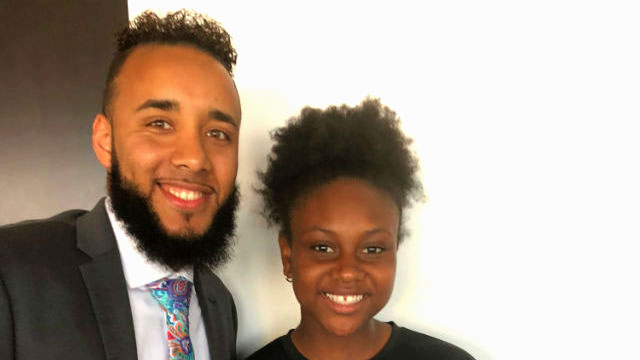
Growing up in a rough section of Boston’s Dorchester neighborhood, law enforcement officer Jeffrey Lopes (pictured above) says, “I saw a lot.”
His experience included losing friends to guns and gangs, and it forged a perspective that he points out can’t be learned from books.
“I bring the perspective of empathy and understanding what people have been through and taking away some of the labels and stigmas that have been attached to certain people by other people,” Lopes says. “Growing up in an urban setting, going to an urban school district, I’ve seen some of these challenges first-hand. And that’s where I see a lot of challenges in policy: a lot of people who do this work have never experienced it. They’re scholars, but they’re not practitioners of the system.”
Lopes, who is the founder of the We Belong: Empowering Youth Through Leadership program and is pursuing a doctorate of law and policy at Northeastern University College of Professional Studies, likes the idea of combining theoretical and experiential learning. It’s one reason he believes the university’s Center for the Study of Sport in Society is an essential institution. And for Lopes’ We Belong program — which creates opportunities for young people to engage in their communities, to connect with police officers in a friendly context, and to explore who they are and who they want to be — the Center has been a key partner.
“The Center has played a vital role in the leadership programs that I run,” Lopes says. “By talking to young people about some of the stereotypes and stigmas that they have, and helping them break that down, it changes people’s mindsets. The Center’s trainers have helped us connect with young people, because they’re coming from a whole different perspective as to who are we, how should we act, how do we give out unconscious bias, and how do we look at things through an empathy lens, versus just looking at what’s on the surface.”
The Center seeks to harness the power and appeal of sport as a catalyst for social justice. According to Executive Director Dan Lebowitz, “We are a solution-based organization focused on how education moves people to a new level of cognizance, a new level of consciousness, and a new level of empowerment that will create change. In a world too readily defined by divisiveness, inequality and disenfranchisement, the Center finds its charge in the positivity of Dean Mary Loeffelholz’s embrace of ‘inclusive prosperity’ and in creating large and ever-increasing portals of equity amidst the norm of inequality. This is our mission, our passion and our sustainable outcome.”
Founded in 1984, the Center’s goals include fostering diversity, creating gender equity, preventing interpersonal violence, challenging racism, sexism and heterosexism, and empowering sport-based youth development networks. It pursues these aims through research, education and advocacy, and its success is reflected in the range of its clientele; the Center has delivered customized trainings to every major college conference, to preparatory schools, to all branches of the U.S. military, to Major League Baseball, to the National Football League, at the South African World Cup, to recidivism prevention programs, to community groups, to police departments, to youth offender programs and, in partnership with the Attorney General and the New England Patriots’ Charitable Foundation, to over 100 high schools in Massachusetts.
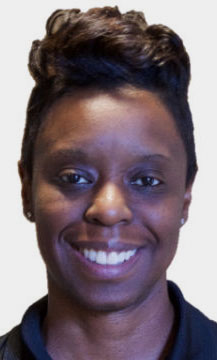
Fundamental to its success has been the expertise and influence of the Center’s staff, all of whom are trained in its unique approach, and all of whom are athletes. Assistant Director of Training, Lisa Markland ’97 (pictured at left), was originally recruited at Northeastern for her skill in the high jump. A former New England champion and two-time America East champion, Markland still holds the high-jump record at Northeastern. She is also someone for whom the drive to help others kicked in at an early age.
“From when I was very young,” Markland says, “if I saw somebody who was being bullied, or who didn’t have what they probably should have — whether they looked disheveled, or they were my friend who was sad because they were hungry — I didn’t really like that. I was always sticking up for someone who was being bullied or who wasn’t included in a game. And then it just kind of carried on through college. If someone was in need, they could sleep on my couch, or we could cook some food. [At first], I thought I was going to be a cop, and that’s how I was going to help. But then the human services thing came in.”
After graduation, Markland worked for several years at the Massachusetts Department of Social Services as a social worker. She then served as program coordinator for Boston’s Roca’s Youth Star program, helping disenfranchised young adults gain life skills and critical credentials such as their GEDs. For the past 15 years, she has worked as a facilitator for the Center for the Study of Sport in Society’s nationally accredited Mentors in Violence Prevention (MVP) program.
According to Lebowitz, Markland’s talent for teaching, and for connecting with people on a personal level, has made her an invaluable member of the Center’s team.
“Lisa has an amazing ability to adapt the curriculum,” Lebowitz says. “She can go into any room and succeed. There is something about her ability to engage people at their basic human level that I’ve never seen.”
Recently, Markland had the opportunity to test her skills in another context, when she and colleague Sam Straus (now a lecturer at Harvard’s Graduate School of Education) traveled to Australia’s island state of Tasmania to facilitate a training at a women’s shelter there. Despite some culture shock, Markland says, what was most eye-opening were the similarities.
“They do some things differently,” she says. “Some of the language is a little bit different. But it was also not different. Sam and I were struck that we were across the world and they were having the same issues that we have here. You think it’s going to be different. But abuse is abuse. The stages of abuse are the same no matter where you go.”
According to Markland, finding such common ground is one key to the workshops she leads. Another is helping participants find their own voices and styles.
“The difference with our trainings,” she says, “is that we’re really facilitating a conversation. We know our curriculum and we do have a flow in our curriculum, but we facilitate it in a way that people are actually running the training. We may narrate a little bit, facilitate a little bit, throw some thoughts out there, but then we allow the group to have the dialogue, and that actually forms the experience of the training.”
In thought exercises and discussions, participants explore what leadership and other concepts mean to them individually, and the various ways that bystanders can respond when they see problems in the real world. Markland notes that effective action can take many forms.
“How you’re going to show up when you see something that is problematic depends upon who you are,” she says. “Your form of leadership might be, ‘I’m not going to put myself in a dangerous situation because I have family who are depending on me to get back home.’ Or it might mean that there needs to be some engagement. It might mean that you take some information, so that when the police come you’re able to give them information. It might mean you call the police. It might mean you take a picture. We talk about the gamut of options that people have.”
While the Center doesn’t teach athletics, they are at the heart of what it does, both in the way that it leverages the influence athletes have and because Center staffers often train the leaders of organizations that do focus on athletics. In the process, it helps them grapple with some tough questions.
“Are kids of different economic and different racial backgrounds getting the same access to fields?” Lebowitz asks. “Are they getting the same access to equipment? We’re still involved in all of those things, but we no longer roll out a ball. We roll out curriculum that changes the way that the organizations that do roll out a ball think about what impact means on a sustainable level for their kids. And I think athletes have a unique voice that kids often understand and like to listen to.”
For Officer Lopes and We Belong, where programming often involves basketball, dodgeball and other games, the Center’s essential contribution is in the dialogue it helps to create and the growth such dialogue can spark. As he works to finish his doctorate and considers the next chapter, Lopes says that his own experience at the Center has had a profound effect on him — one he hopes to carry forward.
“Being in that training and having them break down all the different levels of social justice: how you view people, how you should view people, and how you should connect with people versus the way you do it — it was very, very impactful,” Lopes says.
“It’s important,” he adds. “It’s about continuing that conversation, so that everyone has a seat at the table.”
Collaborative Learning
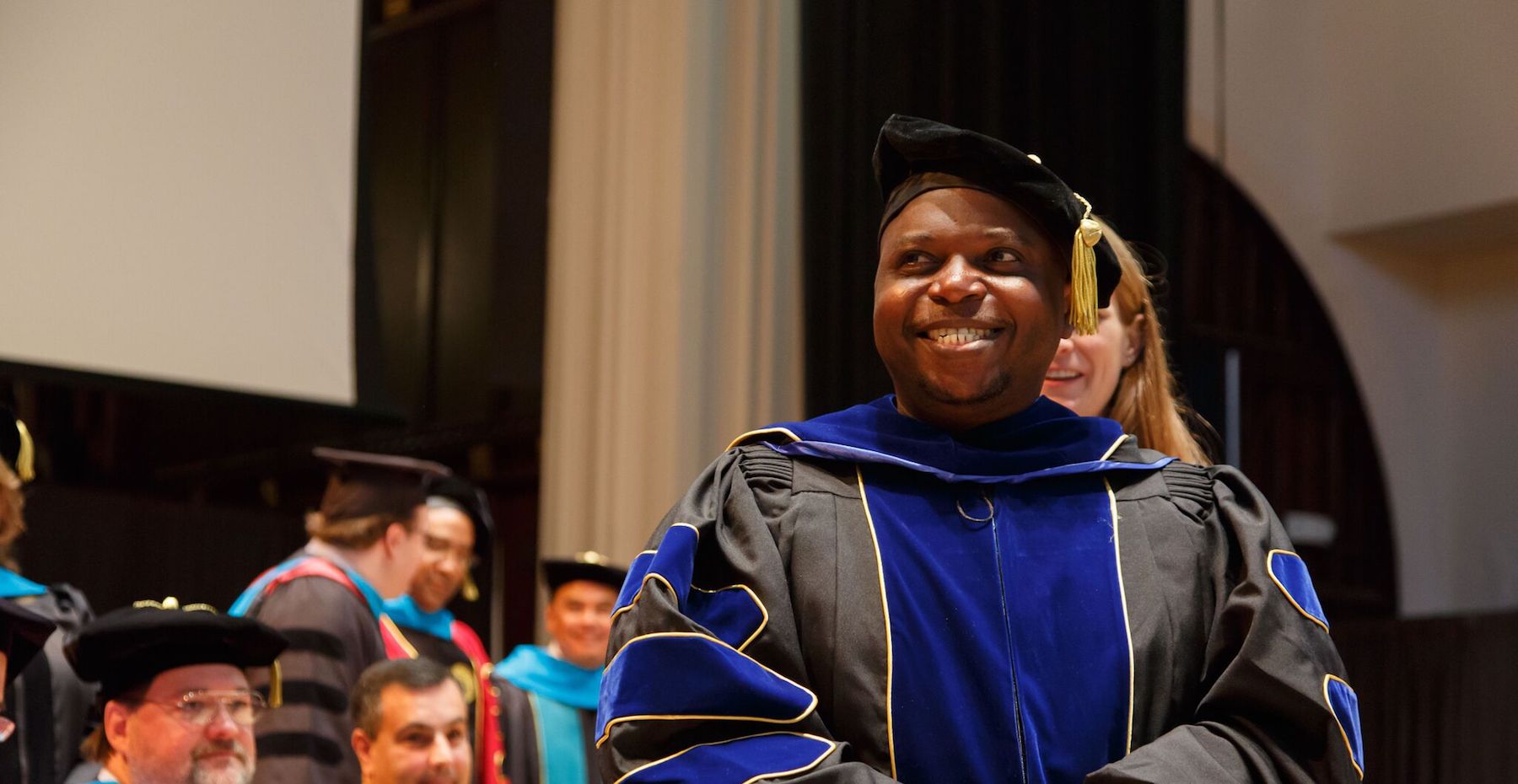
Students from all fields and backgrounds come to Northeastern to earn a Doctor of Law and Policy degree, enabling them to learn not only from the faculty, but also from each other.
The Most Important Way a Doctorate Makes You Smarter

Asking (and Answering) the Right Questions: How Doctorates Enhance Thought Leadership
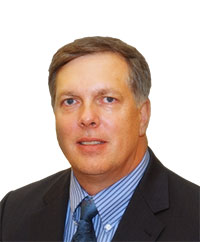
By French Caldwell. French Caldwell is a vice president and Gartner Fellow at Gartner, Inc., an IT industry research advisory firm. He’s enrolled in the Northeastern University College of Professional Studies’ Doctor of Law and Policy program.
As a student in the Doctor of Law and Policy (DLP) program, I’m learning how a wide variety of public and related institutions formulate and execute policy. I spent 20 years in the U.S. Navy and have devoted my career to regulatory compliance and risk management for the information technology industry.
My classmates come from many other industries—everything from national defense to human services—but what brings us together in the DLP is the opportunity to learn systematic methods of policy inquiry and applying those methods to the most pressing questions in our respective fields.
Why is this important? Take the recent string of “glitches” that have impacted electronic trading. In late August, an IT system failure stopped the $50 billion a day NASDAQ stock exchange for three hours. Is that a glitch? When a Goldman Sachs programming error causes a $100 million mistake in a matter of seconds, is that a glitch?
A glitch is a temporary, unforeseeable failure in a piece of equipment that is quickly remedied. However, in the case of the IT failures in global trading systems, it’s not just a piece of equipment or IT that fails, it’s markets that fail; that’s not a glitch, that’s a systemic risk.
These failures have been occurring now for almost two decades. The 1987 Black Monday crash was blamed in part on computerized program trading, which has evolved to high frequency trading (HFT), in which no human is involved. The 2010 Flash Crash, a 1,000 point drop in the Dow in a matter of seconds, was blamed totally on HFT.
Goldman Sachs got off easy in August since under exchange rules, 80 percent of its erroneous options trades were cancelled. Recently, Knight Capital was not so lucky. It took losses on almost all of its erroneous trades, over $450 million worth—four times Knight’s annual profit. Ironically, Knight was rescued from its bad trading positions by Goldman.
In the wake of such events, several regulatory fixes have been proposed for HFT failures, but as you can imagine, formulating solutions to this complex problem is far from simple. Traders are being replaced by IT systems, and hence the risk of market failures from poor IT governance is growing.
Hiring a new CIO probably won’t fix this governance problem. Ensuring that effective governance exists is a board level responsibility, and unless the corporate directors and senior executives are executing effectively their roles in IT governance and risk oversight, no matter the regulatory fixes, the problems will continue.
This is not an abstract problem. When a major exchange shuts down, billions of dollars in trades halt. If that were to happen on a day when a volatile event occurs, such as the Fed deciding to raise interest rates, panic could set in when trading resumed. This type of panic has real consequences across the entire economy.
This is why I chose the DLP. I’m surrounded by smart, curious people who may not know anything about IT security issues and high frequency trading, but they are dealing with similarly important and complex issues in their own fields, so bring their unique expertise and perspective to class.
In this way, I hope, our collective wisdom will help answer the important policy questions—regardless of the industries we individually work in.
French Caldwell is a vice president and Gartner Fellow at Gartner, Inc., an IT industry research advisory firm. French leads research in governance, risk management and compliance. He’s enrolled in the Northeastern University College of Professional Studies’ (CPS) Doctor of Law and Policy (DLP) program with the goal of exploring the role of emerging information technologies on how public policy is made.
Doctoral Candidates Earn Symbol of Academic Achievement
“You have earned your place as an active scholar.”
Candidates for the Doctor of Law and Policy degree were awarded the most visible symbol of their accomplishment in the Northeastern University College of Professional Studies Doctoral Hooding ceremony on September 30th at the Fenway Center on the Northeastern Boston campus.
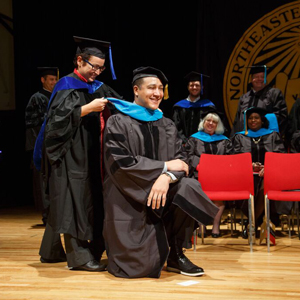
With family members, friends, alumni, faculty, and staff in attendance, 14 doctoral candidates were recognized, called forward to have their academic hoods placed over their shoulders by their thesis advisors, and heard their thesis title announced.
Thesis topics covered a broad spectrum of policy matters, ranging from the thesis by Paula A. Amato entitled, “The Affordable Care Act: Impact on Business” to the thesis by Junis J. Warren entitled, “An Evaluation of Integration Programs for Deportees in Latin America and the Caribbean.”
John LaBrie, dean of the College of Professional Studies, offered his praise, saying, “Candidates: by completing your doctoral studies, you strengthen and continue the legacy of Northeastern University. Here at Northeastern, we say that we are a university built on a tradition of engagement with the world. I can think of no greater example of the power of that engagement than the candidates assembled here.”
LaBrie and the faculty were joined on stage by special guest, Joseph L. Chillo, president of Newbury College in Brookline, MA, a 2014 graduate of the Doctor of Law and Policy, who also addressed the candidates.
Faculty Speaker
The interim director of the Doctor of Law and Policy program, Mary Thompson-Jones, Professor of the Practice, reflected on the sacrifice that the doctoral students made to pursue studies at the highest level while working full-time in demanding careers, and the commitment of students’ families, as well, to support them.
And, Thompson-Jones looked forward into the professional lives of the newest doctorates, noting, “You’ve gained lifelong cohort-mates. Your relationships will not end once you leave this room. You’ll continue to stay in touch sharing life’s milestones, seeking advice, and getting together just for fun. Cherish your cohort!
“You’ve also gained new windows of insight. For all of you, I hope your journey will not end with your hooding. Do not succumb to the temptation to put the thesis on the shelf, watching it gradually go dusty as the years fly by. Instead, use it to engage with your professional world. Use it as a springboard, building on what you have begun, researching, publishing, and being an intellectual presence in your field. You have earned your place as an active scholar.”
Developed jointly by the College of Professional Studies and Northeastern’s Law and Public Policy program, the Doctor of Law and Policy program is designed for experienced professionals who are interested in the origins, development, implementation, and analysis of legal and public policy decisions in government and related institutions. The program prepares students to advance their careers within a variety of fields while focusing their thesis research on a precise law and policy topic.